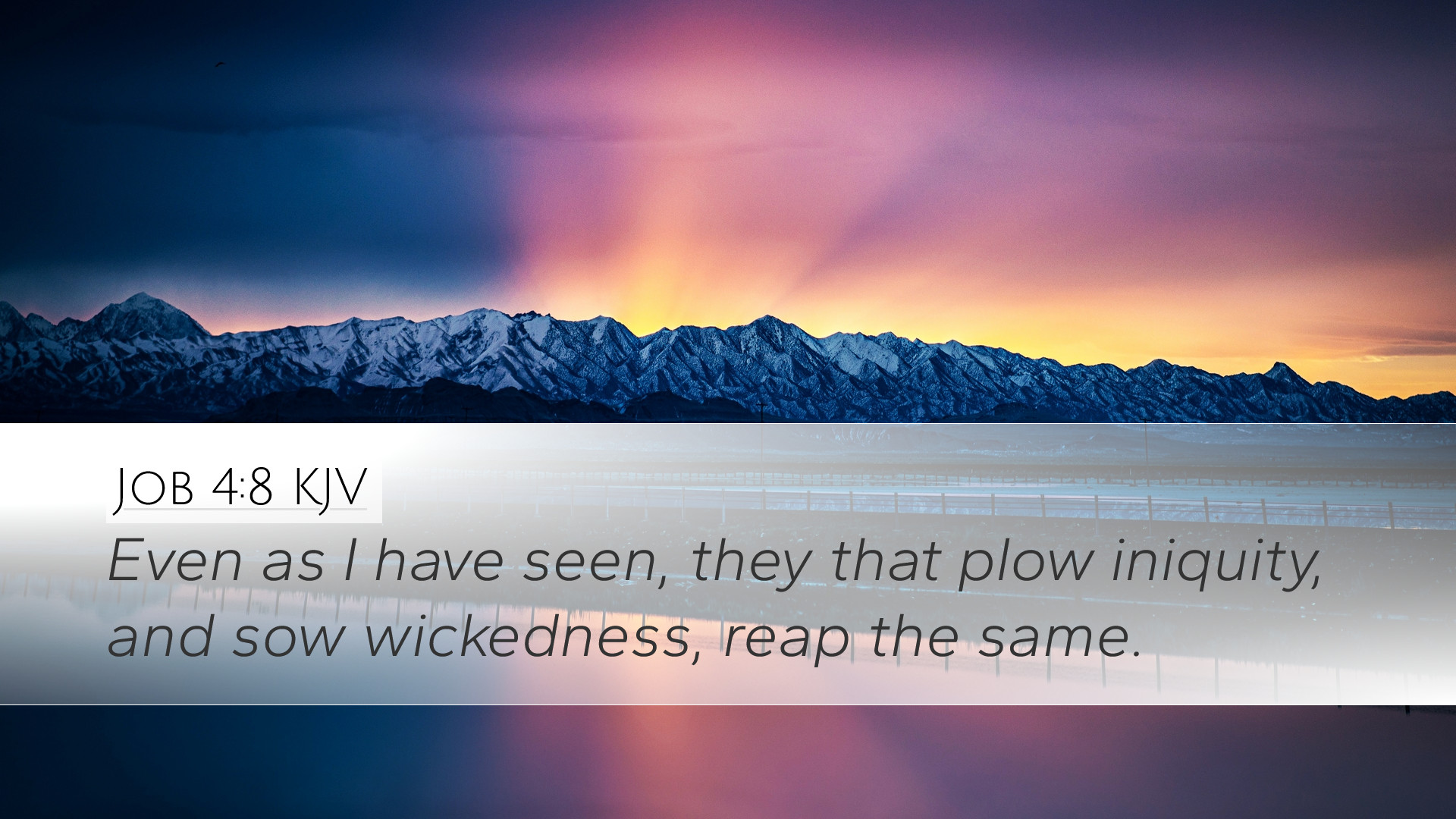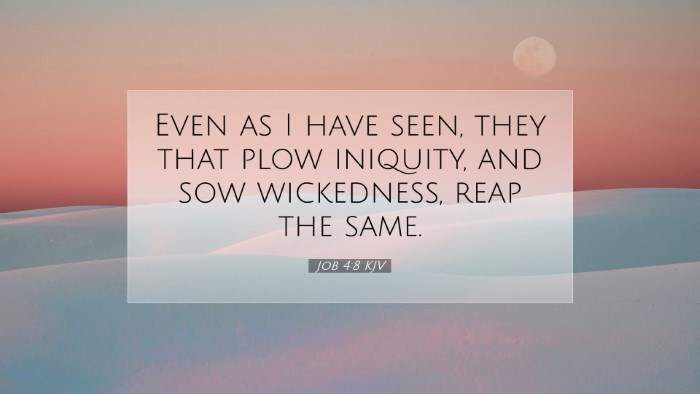Old Testament
Genesis Exodus Leviticus Numbers Deuteronomy Joshua Judges Ruth 1 Samuel 2 Samuel 1 Kings 2 Kings 1 Chronicles 2 Chronicles Ezra Nehemiah Esther Job Psalms Proverbs Ecclesiastes Song of Solomon Isaiah Jeremiah Lamentations Ezekiel Daniel Hosea Joel Amos Obadiah Jonah Micah Nahum Habakkuk Zephaniah Haggai Zechariah MalachiJob 4:8
Job 4:8 KJV
Even as I have seen, they that plow iniquity, and sow wickedness, reap the same.
Job 4:8 Bible Commentary
Commentary on Job 4:8
Verse: "Even as I have seen, they that plow iniquity, and sow wickedness, reap the same."
Introduction
The verse from Job 4:8 encapsulates a profound truism regarding the moral fabric of the universe, highlighted through the allegory of farming. This olive branch of wisdom is presented by Eliphaz the Temanite, one of Job's friends, showcasing the prevailing belief that human actions, whether virtuous or wicked, yield corresponding consequences. As we delve into the interpretations provided in public domain commentaries, we seek to extract insights that resonate with pastors, students, theologians, and scholars alike.
Contextual Background
Understanding the context of Job is essential to grasp the significance of this verse. The Book of Job grapples with the themes of suffering, the nature of God, and human righteousness. Job, a man of unwavering faith, faces immense trials, prompting his friends to offer various explanations for his afflictions. Eliphaz's admonition serves as an assertion of the principle of retributive justice—suggesting that suffering is often a direct result of sin and wrongdoing.
Insights from Matthew Henry's Commentary
Matthew Henry interprets Job 4:8 as an affirmation of divine justice, where he observes that the natural order reflects a moral order. In his commentary, Henry emphasizes:
- Reaping What is Sown: Henry resonates with the principle that one cannot escape the consequences of their actions. The metaphor of plowing and sowing establishes a direct link between human deeds and their outcomes. A life characterized by iniquity inevitably leads to hardship.
- The Certainty of Justice: He points out that both the righteous and the wicked will eventually see the fruits of their labor, reinforcing the idea that God observes all deeds and will administer justice.
- Call to Self-Reflection: Henry encourages readers to reflect on their own lives, examining the seeds they are sowing, and the spiritual implications of their actions.
Insights from Albert Barnes' Commentary
Albert Barnes provides a more moral and ethical perspective on Job 4:8. He highlights the agricultural metaphor used by Eliphaz, drawing essential lessons:
- Natural Law of Retribution: Barnes emphasizes that the observation made by Eliphaz reflects an observable reality in life—wickedness leads to sorrow. He states that this verse signifies a principle that has stood the test of time.
- The Assurance of Divine Oversight: According to Barnes, this verse reassures believers of God’s omniscience and omnipotence. Although Job’s plight may suggest otherwise, God ultimately oversees justice, and the prosperity of the wicked is fleeting.
- Educative Purpose of Suffering: Barnes suggests that Eliphaz’s words were meant to educate Job on the severity of sin, and how suffering can serve as a divine corrective.
Insights from Adam Clarke's Commentary
Adam Clarke adopts a comprehensive approach in his commentary on Job 4:8, adding layers of understanding to the text:
- Observational Wisdom: Clarke notes that Eliphaz speaks from his own experiences and observations rather than direct revelation, implying that often, wisdom arises from lived experience.
- Condemnation of Wrongdoing: His insights reflect on the societal structures that judge individuals—it underlines that community norms often emphasize justice; therefore, those who engage in immoral behavior should expect consequences.
- Complexity of Suffering: Clarke warns against simplifying the connection between sin and suffering. While there is merit to the principle being asserted, the realities of life are often more complicated; hence, Job's suffering cannot be solely attributed to his wrongdoing.
Theological Implications
The verse elucidates central theological themes, particularly concerning divine justice and human integrity. It calls into question the adequacy of a retributive viewpoint in understanding human suffering. The diverse interpretations provided by the commentators suggest discussions around the following:
- God's Justice Versus Human Perspective: Eliphaz embodies the tendency to apply simplistic moral reasoning to complex situations, reflecting a wider theological dilemma concerning God's justice.
- The Role of Suffering: Job's innocence raises critical questions about the nature and purpose of suffering in the lives of faithful individuals. The commentaries invite the readers to contemplate the multifaceted nature of suffering beyond the basic cause and effect.
- Call to Righteous Living: Despite the inherent complexities, the principle of “reaping what is sown” remains a vital reminder of the importance of righteousness, underscoring the need for believers to live a life that honors God.
Practical Application
The richness of Job 4:8 lies not only in its theological depth but also in its applicability to daily life:
- Self-Examination: Believers are encouraged to reflect on their actions. Engaging in honest self-examination can help prevent the sowing of seeds of iniquity that could lead to negative consequences.
- Culture of Accountability: Church communities can benefit from fostering environments that hold individuals accountable for their actions, and cultivate a culture that promotes righteousness.
- Compassion in Suffering: Understanding the complexities of suffering should lead to greater compassion. Instead of casting judgment, communities should provide support and empathy to those facing hardships.
Conclusion
Job 4:8 serves as a deeply reflective and challenging verse that continues to invite exploration into the divine relationship between sin, suffering, and justice. Insights drawn from Matthew Henry, Albert Barnes, and Adam Clarke enrich our understanding of this text, offering valuable lessons regarding the consequences of human actions and the nature of God's justice. For pastors, students, theologians, and scholars, this verse holds enduring significance—a reminder to cultivate lives marked by righteousness as we navigate the complexities of faith and experience.


